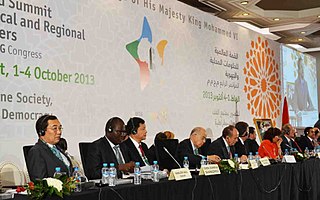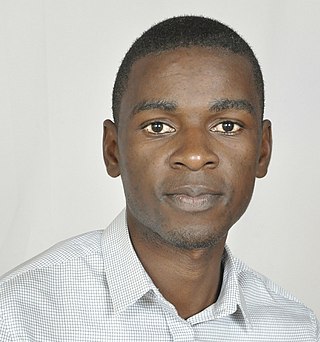
The International Astronomical Union is a nongovernmental organisation with the objective of advancing astronomy in all aspects, including promoting astronomical research, outreach, education, and development through global cooperation. It was founded in 1919 and is based in Paris, France.

The University for Peace (UPEACE) is an international university and intergovernmental organization. The university was established as a treaty organisation by the United Nations General Assembly in 1980.

The United Nations Economic Commission for Europe is one of the five regional commissions under the jurisdiction of the United Nations Economic and Social Council. It was established in order to promote economic cooperation and integration among its member states.

The United Nations System consists of the United Nations' six principal organs, the Specialized Agencies and related organizations. The UN System includes subsidiary bodies such as the separately administered funds and programmes, research and training institutes, and other subsidiary entities. Some of these organizations predate the founding of the United Nations in 1945 and were inherited after the dissolution of the League of Nations.

The Economic Cooperation Organization or ECO is an Asian political and economic intergovernmental organization that was founded in 1985 in Tehran by the leaders of Iran, Pakistan, and Turkey. It provides a platform to discuss ways to improve development and promote trade and investment opportunities. The ECO is an ad hoc organisation under the United Nations Charter. The objective is to establish a single market for goods and services, much like the European Union. After the dissolution of the Soviet Union, the ECO expanded to include Afghanistan, Azerbaijan, Kazakhstan, Kyrgyzstan, Tajikistan, Turkmenistan, and Uzbekistan in 1992.

The Organization of Ibero-American States, formally the Organization of Ibero-American States for Education, Science and Culture, is an international organization made up of 23 members states of Iberophone nations in Europe and the Americas, as well as one member in Africa. The OEI's membership is composed of all of the sovereign states of Ibero-America and the Iberian Peninsula, as well as Equatorial Guinea. All members are Portuguese and Spanish speaking nations, in addition to Andorra, which is predominantly Catalan speaking, though the organization does not include all the Iberophone nations of the world.
Education International (EI) is a global union federation (GUF) of teachers' trade unions consisting of 401 member organizations in 172 countries and territories that represents over 30 million education personnel from pre-school through university. It is one of the world's largest sectoral global union federations.
The Métis Nation—Saskatchewan is a federally-recognized government that represents the approximately 80,000 Métis people in the province of Saskatchewan, Canada. It is affiliated with the Métis National Council. Glen McCallum was elected as president in 2017 and reelected in 2021.

The Intergovernmental Authority on Development (IGAD) is an eight-country trade bloc in Africa. It includes governments from the Horn of Africa, Nile Valley and the African Great Lakes. It is headquartered in Djibouti.

The United Nations Human Settlements Programme (UN-Habitat) is the United Nations programme for human settlements and sustainable urban development. It was established in 1977 as an outcome of the first United Nations Conference on Human Settlements and Sustainable Urban Development held in Vancouver, Canada, in 1976. UN-Habitat maintains its headquarters at the United Nations Office at Nairobi, Kenya. It is mandated by the United Nations General Assembly to promote socially and environmentally sustainable towns and cities with the goal of providing adequate shelter for all. It is a member of the United Nations Development Group. The mandate of UN-Habitat derives from the Habitat Agenda, adopted by the United Nations Conference on Human Settlements in Istanbul, Turkey, in 1996. The twin goals of the Habitat Agenda are adequate shelter for all and the development of sustainable human settlements in an urbanizing world.

Founded in 1955, the NATO Parliamentary Assembly serves as the consultative interparliamentary organisation for the North Atlantic Alliance. Its current President is Joëlle Garriaud-Maylam from France, elected in 2022. Its current Secretary General is Ruxandra Popa; she has been in this position since January 2020.

The United Nations Regional Groups are the geopolitical regional groups of member states of the United Nations. Originally, the UN member states were unofficially organized into five groups as an informal means of sharing the distribution of posts for General Assembly committees. Now this grouping has taken on a much more expansive and official role. Many UN bodies are allocated on the basis of geographical representation. Top leadership positions, including Secretary-General and President of the General Assembly, are rotated among the regional groups. The groups also coordinate substantive policy and form common fronts for negotiations and bloc voting.

The Community of Democracies (C.O.D), established in 2000, is an intergovernmental coalition of states. Its aim is to bring together governments, civil society and the private sector in the pursuit of the common goal of supporting democratic rules, expanding political participation, advancing and protecting democratic freedoms, and strengthening democratic norms and institutions around the world. The Warsaw Declaration had outlined the task of promoting democracy. It is disputed if the coalition qualifies as an International Organization in the legal sense.

The National Economic and Development Authority is an independent cabinet-level agency of the Philippine government responsible for economic development and planning. It is headed by the president of the Philippines as chairman of the NEDA board, with the Secretary of Socioeconomic Planning as vice-chairman. A number of Cabinet members, the Governor of the Bangko Sentral ng Pilipinas, the Chairperson of the Metropolitan Manila Development Authority, the Chief Minister of Bangsamoro, the Secretary of Information and Communications Technology, the Chairman of the Subic–Clark Area Development Corporation, and the National President of the Union of Local Authorities of the Philippines are members of the NEDA Board.
As the peak organisation representing Professional Planners across the globe, the Commonwealth Association of Planners, abbreviated to CAP, has championed, promoted and connected planners and planning since its inception almost 50 years ago.

United Cities and Local Governments (UCLG) is an umbrella international organisation for cities, local and regional governments, and municipal associations throughout the world that is concerned with representing and defending the interests of local governments on the world stage.

The World Assembly of Youth (WAY); French: Assemblée Mondiale de la Jeunesse, Spanish: Asamblea Mundial de la Juventud is the international coordinating body of national youth councils and national youth organisations. The full members of WAY are national youth councils. WAY currently has 140 member organisations from all continents. As the international coordinating body of national youth councils, WAY has special consultative status with the United Nations, the highest status possible for a non-governmental organization. WAY co-operates with the UN and many of its special agencies, particularly with UNAIDS, UNEP, ILO, UNESCO, UNFPA, UNICEF, UNDP, UNCTAD and WHO.

The Union for the Mediterranean is an intergovernmental organization of 43 member states from Europe and the Mediterranean Basin: the 27 EU member states and 16 Mediterranean partner countries from North Africa, Western Asia and Southern Europe. It was founded on 13 July 2008 at the Paris Summit for the Mediterranean, with an aim of reinforcing the Euro-Mediterranean Partnership (Euromed) that was set up in 1995 as the Barcelona Process. Its general secretariat is located in Barcelona, Spain.

The Uganda Local Governments’ Association (ULGA) is the National Association of Local Governments of Uganda. It is a private, voluntary and non-profit body.

Archimedes Muzenda is the Secretary-General of the African Planning Society. Prior to his appointment as the secretary-general in January 2020, he previously served as the director of African Planning Society from January 2019. Archimedes Muzenda is the inaugural holder of the office after it was established following the merger of African Planning Association with African Urban Community of Practice (AUCoP) an initiative of African Urban Institute to form African Planning Society. His mandate as inaugural secretary-general was outlined at the conference of Association of African Planning Schools in Tanzania.

















